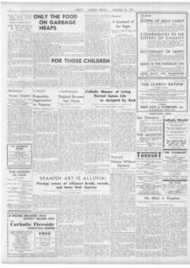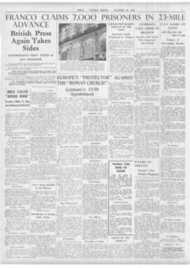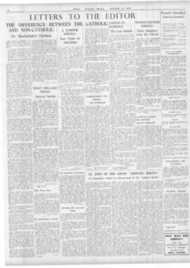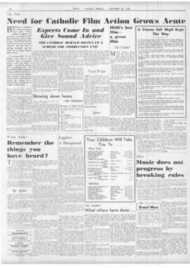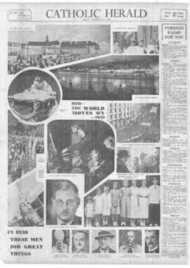Page 12, 30th December 1938
Page 12

Report an error
Noticed an error on this page?If you've noticed an error in this article please click here to report it.
Tags
Share
Related articles
Death Of James Sexton
Autobiography
Childhood In Rome
Happy Family
Of Persons And Places
Sir James Sexton
A long life of useful service closed last Tuesday by the death of Sir James Sexton, C.B.E., at the age of eighty-two. Liverpool and St. Helens, in particular, were places associated with that veteran's work; but Labour throughout the country is indebted to him for almost lifelong efforts on behalf of his fellow workers.
By his co-religionists Sir James Sexton will be gratefully remembered as the man who, time after time, rallied opposition, at the Trades Union Congress, to a resolution which sought to commit Trade Unionism to the principle of secular education. His was not a popular role; but persistency, sincerity, and power of advocacy succeeded, and his efforts brought about the defeat of the secular policy.
James Sexton was born at Newcastleen-Tyne. As an infant, however, he was taken to St. Helens, which in all but the strict and literal sense may be regarded as his home town. There, as a small boy, he attended the Catholic elementary school in the Lowe House parish; there, too, at eight years of age, he got his first job, in the glass works; and it was St. Helens that sent him to Parliament in 1918 and continued for thirteen years to give him its political confidence.
From St. Helens young Sexton went out, a great many years ago, to try his fortune at sea. That experience, which lasted several years, gave him his first contact with life in dockside ports, and filled him with the desire, which he afterwards cultivated to good effect, to work for the betterment of the dockers' conditions. He became a dock worker in Liverpool, and gave up that work only perforce, as the result of an accident, in 1882. Some years later he became General Secretary of the National Union of Dock Labourers, a post which proved the stepping-stone to increased influence in the Trade Union movement, and ultimately to Parliamentary life.
In 1910 Sexton was made a Justice of the Peace for Liverpool; in 1917, in which year he was honoured with the C.B.E., he was elected vice-chairman of the National Transport Workers' Federation. The year 1930 brought him knighthood, and saw him an alderman of the Liverpool Council, and in 1934 the City of Liverpool conferred upon him its honorary freedom.
Sir James Sexton will be remembered, also, as a playwright. His strike drama, The Riot Act, afterwards renamed Democracy, was produced in 1914 in Liverpool. In 1929 it was re-staged in unique circumstances, the cast being drawn from members of the House of Commons.
As a public speaker Sexton was homely, forceful, direct, with touches of humour and sentiment which made it always a pleasure to listen to him. This appreciation may fittingly conclude with words which fell from his own lips when he addressed the National Catholic Congress at Manchester twelve years ago. " The Rev. Chairman," he said, " has done me the honour of referring to the little thing I did on the floor of the Labour Parliament [the defeat of the secular education resolution, already mentioned.] It was not I, personally. who did it; it was the inspiration, the early environment, of a truly religious mother."
blog comments powered by Disqus





